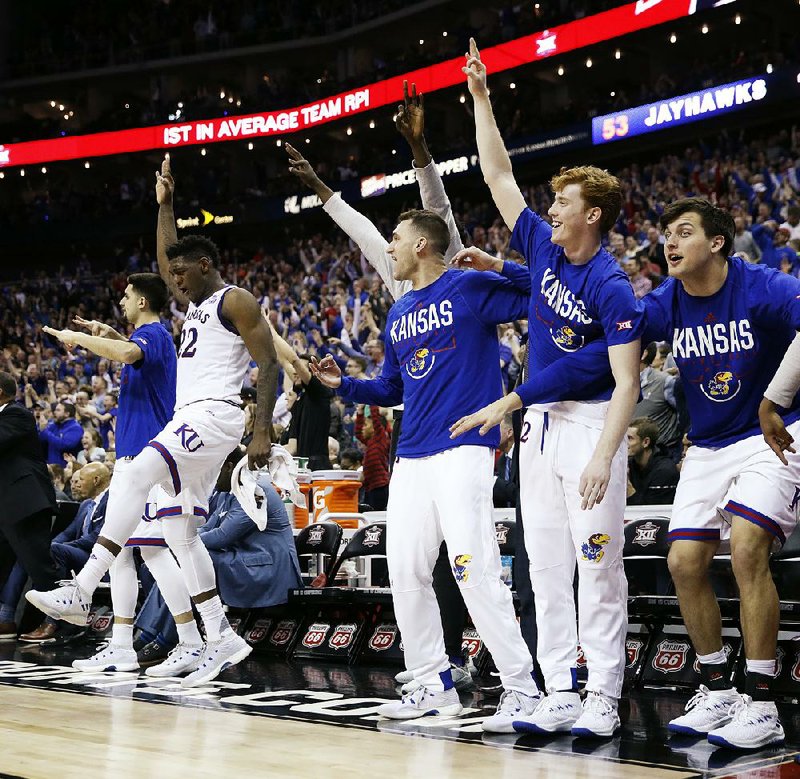From the top seed in the NCAA Tournament -- Virginia -- to those that barely made it into the bracket -- Arizona State and Syracuse -- it feels as though everyone involved in March Madness is on the bubble this year.
The brackets came out Sunday, replete with the usual fanfare that accompanies America's biggest office pool. Villanova, Kansas and Xavier joined Virginia as No. 1 seeds, but they, along with the other 64 contenders, will play against the backdrop of an investigation-riddled season in which bribes and payoffs made bigger headlines than 3s and layups.
The tournament begins Tuesday with opening-round games featuring a matchup of bubble teams UCLA and St. Bonaventure, then kicks into full swing Thursday and Friday at eight sites around the country. The Final Four is March 31 and April 2 in San Antonio.
The region to watch will be the Midwest, which is top heavy with Kansas, Duke and Michigan State, who were ranked in the top 4 in the AP preseason poll. It also features arguably the nation's most electric player in Trae Young, who led Oklahoma in as a No. 10 seed despite going 2-8 down the stretch.
Questioned by Charles Barkley during the selection show about the Sooners, Bruce Rasmussen, chairman of the NCAA selection committee, said: "Games in November and December count the same as games in February and March."
Among the snubs this year are St. Mary's, which missed despite a 28-5 record. It's only big victory this season was at Gonzaga in January.
Louisville, with an RPI of 39, became the highest-rated team in that index to miss the tournament, backing the concept that the selection committee would look more heavily at other factors. Notre Dame got no love either for its deep run into the ACC tournament or the return of its best player, Bonzie Colson.
The place to be during this tournament will likely be Boise. It features a possible second-round South matchup between No. 5 Kentucky and No. 4 Arizona, each of which won their conference tournaments.
"I had to ask my guys, 'How many of you know what state Boise is in?' " Coach John Calipari said of the long trip his team faces.
Also in Idaho are defending national runner-up Gonzaga, which would have a home-court advantage of sorts in a second-round matchup against either Ohio State or South Dakota State.
The ACC led the way with nine teams in the tournament, matching a record the ever-expanding conference set last year. The SEC sent eight teams and the Big 12 sent seven. The Big Ten only sent four and the Pac-12 only had three in down years for both marquee conferences.
Shortly after the Final Four, a commission led by former Secretary of State Condoleezza Rice is expected to deliver recommendations from an investigation triggered by an FBI probe that led to charges last fall against assistant coaches, agents, employees of apparel companies and others.
No fewer than a dozen teams in the tournament have been named either in the FBI investigation or in media reports that allege coaches and others have directed payments and improper benefits to recruits and players -- thus, breaking rules that go to the core of the amateur-sports code that defines both the NCAA and the "student-athletes" who make this billion-dollar business run.
They range from teams that made it into the tournament off the so-called bubble -- Alabama -- to one of the best teams in the country. Arizona, a No. 4 seed in the South, has been roiled by a report that wiretaps caught coach Sean Miller discussing a $100,000 payment to freshman Deandre Ayton. Miller has strongly denied the accusation, though the story line figures to follow the Wildcats through what could be a long run in the tournament.
Rasmussen said the investigations played no part in the bracket-filling process.
Once this party is over, many observers have said that change of some sort will be coming in college basketball.
"I don't think it's just going to be a little blip on the radar," said John Tauer, the championship-winning coach at Division III St. Thomas in Minnesota, who doubles as a social psychology professor. "I think this runs deep enough and involves enough people in programs that something's got to change."
Sports on 03/12/2018
